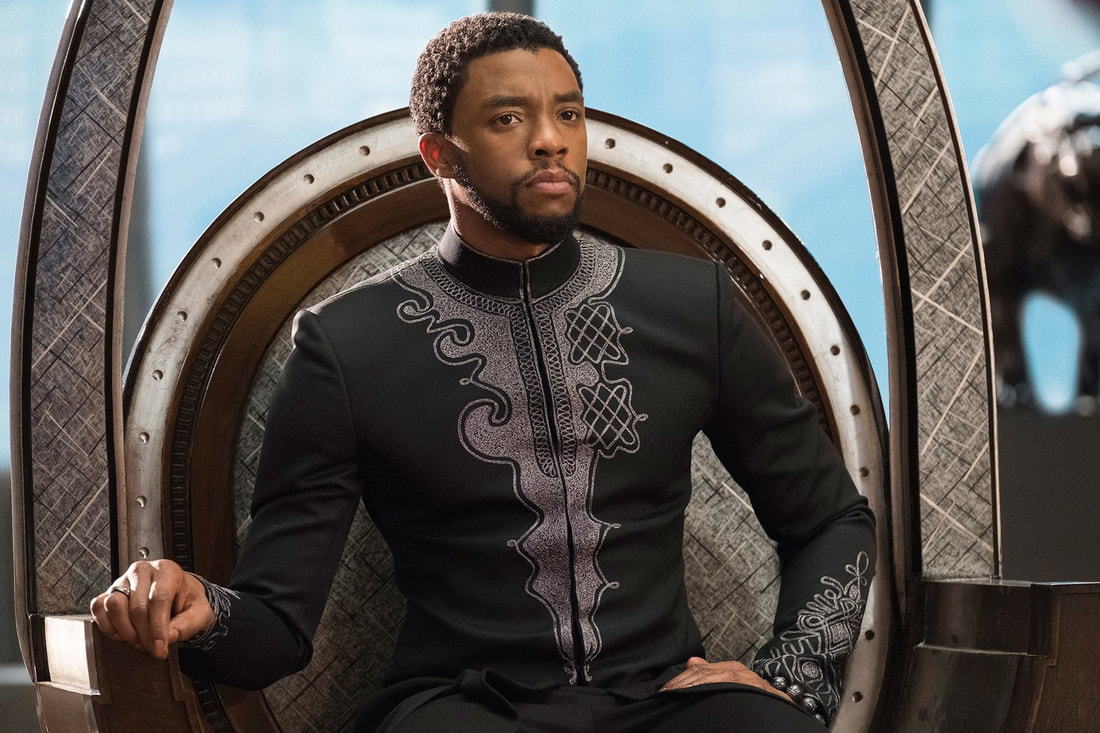|
It's the best Marvel film to date, and an achievement in every possible category. Marvel’s Black Panther is more than just a movie — it’s a mic drop with a reverberating, triumphant thump that serves as a wake-up call for anyone still sleeping on the cinematic potential of superhero movies. It’s as good as you’ve heard, it’s better than you expect, and it accomplishes more for its genre than anyone could have reasonably predicted, even with the well-earned hype around its success.
Trying to describe Black Panther feels like performing an afrocentric Stefon sketch from Bill Hader’s SNL years: “This movie has everything. Outstanding performances from its main cast, important magnets, Michael B. Jordan’s cosmetically scarified torso, a wig toss, frank discussions of isolationist politics, and a smoochy rhino.” Black Panther is so packed with excellence that it could easily have been overwhelming, but it’s tied together with smart world-building that makes sense of every wondrous thing on screen, and it’s through that world-building that the movie transcends its parts to become a remarkable whole. One of the more striking things about Black Panther is that, despite being the 18th movie in the Marvel Cinematic Universe, it stands easily on its own. Where previous Marvel films leaned on the audience’s knowledge of the MCU's shared plot and mined laughs from in-jokes or references to other films, Black Panther’s characters barely regard the expanding MCU plot and focus instead on the relationships and issues facing their family, friends, and nation. This is a good thing, as Black Panther has the unenviable job of introducing watchers to a fictional country with centuries of history, as well as an entirely new (and delightful) set of heroes, most of whom have never appeared on screen before. It’s a pleasure to admit that Black Panther does this well, and the character moments between Black Panther/T’challa (Chadwick Boseman), his sister Shuri (Letitia Wright), his general Okoye (Danai Gurira), and even the villain (Michael B. Jordan, of the aforementioned torso), clearly paint the picture that these are real people with backstories and personalities whose interactions are grounded in the super-reality in which they live. Black Panther also gives audiences its best-ever Marvel villain in Erik “Killmonger” Stevens. He’s not the biggest or the baddest villain in the Marvel canon, but he is absolutely its most complex, most interesting, and surprisingly — its most relatable. Many of the people watching Black Panther will listen to his reasoning and nod along, recognizing that this supposed bad guy has some valuable points to make even if his methods are despicable. Michael B. Jordan’s performance as Killmonger is an extension of his previous work with director Ryan Coogler, particularly in 2015’s Creed; in both films the actor and director labored to produce characters whose actions speak to a history of pain both intimate and political. This kind of complexity is quickly becoming Jordan’s specialty, and as Killmonger he flexes his skill at performing it. Another thing Black Panther has that many movies lack regardless of their genre is a genuine sense of responsibility in dealing with the social issues that drive its plot. Its handling of the implied realities of the wealthiest country in the world being African and xenophobic takes both sides of an isolationist perspective into account, an issue that in the wrong hands could have had a disastrous message. It also, as an American production, addresses the black American experience throughout and asks the necessary questions about how much of the country’s legacy of slavery, discrimination, and continued racism has to do with Wakandan indifference. To say more would be to spoil the plot of the movie, but suffice it to say that if there is one Marvel movie that can leave you thinking about the geopolitical ramifications of a hidden, global, and most important, black superpower, it’s this one. Black Panther is only the second mainstream superhero movie to star a black hero (the honor of the first goes to 1998's Blade), but its impact on the MCU and its genre will surely surpass the mere fact of its existence. It is the best of Marvel’s offerings so far, taking only the best of its predecessors (there’s a healthy dose of Thor: Ragnarok’s bizarre humor, The Winter Soldier’s focus on friendship and loss, and Iron Man’s top-of-the-world swagger) and remixing them into a celebration of black excellence and outstanding filmmaking. See Black Panther in theaters. See it twice if you want to! With a whole new Marvel world to explore, you’re going to want to stay in Wakanda...forever. |
Follow our updatesArchives
October 2023
Categories |

 RSS Feed
RSS Feed
